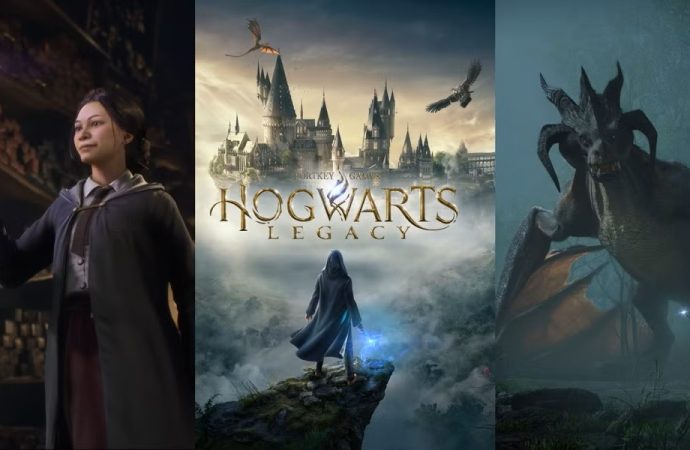Introduction Hogwarts Legacy arrived in early 2023 with massive fan excitement. Set in the beloved wizarding world, the game promised an open-world adventure full of magic, exploration, and choice. Yet the release also sparked heated debate. Some players praised the game’s inclusive features—customizable characters, diverse story paths, and accessibility options. Others criticized its ties to
Introduction
Hogwarts Legacy arrived in early 2023 with massive fan excitement. Set in the beloved wizarding world, the game promised an open-world adventure full of magic, exploration, and choice. Yet the release also sparked heated debate. Some players praised the game’s inclusive features—customizable characters, diverse story paths, and accessibility options. Others criticized its ties to controversial figures and decisions, including the ongoing backlash against the broader Harry Potter franchise. This tension between inclusion and controversy has made Hogwarts Legacy one of the most polarizing game launches in recent memory.
A New Era for Wizarding Fans
For many fans, Hogwarts Legacy offers their first chance to attend Hogwarts in a timeline before the events of the original books. Players can create their own witch or wizard, choose a house, learn spells, brew potions, and forge alliances with classmates. The game’s dedication to detail—from the moving staircases to hidden classrooms—immerses players in a living, breathing world.
The developers also introduced modern gaming features to improve accessibility. Colorblind modes adjust UI colors for players with color vision deficiencies. Subtitles and adjustable text sizes make dialogue easier to follow. Difficulty settings allow novice gamers to focus on story while giving veterans a challenging combat experience. These inclusive design choices demonstrate a commitment to broadening the game’s appeal.
Inclusion in Gameplay and Story

Image by: Yandex.com
1. Character Customization
At the heart of Hogwarts Legacy is character creation. Players choose skin tone, hairstyle, facial features, and body types. Non-binary and gender-neutral options let players select voice and appearance independently. This flexibility ensures every player can feel represented in the wizarding world.
Spells and abilities also adapt to playstyle. A player who loves stealth can learn spells that silence footsteps or cloak their presence. A more combat-oriented player can specialize in powerful offensive charms. The freedom to tailor gameplay is a strong example of inclusion in design.
2. Accessibility Features
Beyond visuals, Hogwarts Legacy includes features to support players with disabilities. Audio cues announce on-screen objectives for those with low vision. Haptic feedback options help deaf or hard-of-hearing players feel in-game events through their controllers. Customizable controls allow remapping buttons for ease of use. By offering these options, the game reaches a wider audience and sets a new standard for inclusive game design.
3. Diverse Story Paths
The narrative in Hogwarts Legacy also reflects modern values. Several side quests focus on social justice themes, such as fighting prejudice against magical creatures or standing up to corrupt authorities. Players make moral choices that affect character relationships and the game world. These story arcs acknowledge complex real-world issues while staying true to the magical setting.
Sources of Controversy
Despite its progressive features, Hogwarts Legacy has been mired in controversy from the start. Critics point to three main areas of concern.
1. Author Allegations
The most prominent controversy stems from comments made by the original Harry Potter author. Many fans and activists consider these views harmful to transgender and non-binary communities. Some called for a boycott of the game, arguing that any purchase would indirectly support the author through royalties. Others maintained the game should be judged on its own merits, separate from the creator’s personal views.
This debate pits inclusive gaming values against ethical consumerism. While the game’s developers distanced themselves from the author’s opinions, they cannot fully sever ties to the larger franchise. As a result, some players find it difficult to support a game set in that universe.
2. Casting Decisions
Another flashpoint has been voice casting. Some fans criticized the choice of actors for key roles, arguing they did not represent the characters authentically. Others praised the diversity of the cast, noting that individuals from various backgrounds bring fresh energy to the wizarding world. This divide reflects broader conversations in entertainment about representation versus faithfulness to source material.
3. In-Game Ethics
Even within the game itself, moral gray areas sparked debate. Certain gameplay mechanics—such as using mind-control spells on NPCs—raised questions about player agency and consent. Some critics argued that normalizing such actions risks trivializing serious ethical issues. Developers responded by adding in-game warnings and the ability to skip morally troubling scenes. Yet for some players, these fixes came too late.
Fan and Critic Reactions
The polarizing nature of Hogwarts Legacy shows in reviews and community discussions. Review aggregators display a wide range of scores, with some praising the game’s world-building and others lambasting it for extraneous technical issues. Social media platforms saw simultaneous celebrations of the game’s beauty and calls for disavowal on ethical grounds.
Content creators on video platforms and streaming services have had varied approaches. Some focus purely on gameplay and exploration tips, avoiding the controversy altogether. Others dedicate streams to discussing the ethics of fandom, the impact of authorial intent, and how inclusion in games interacts with real-world politics. These differing approaches highlight that players no longer view games as isolated entertainment but as touchpoints for broader cultural debates.
Market Impact and Sales
Despite—or perhaps because of—the controversy, Hogwarts Legacy achieved strong sales. It broke records in several markets during its launch week. Retailers reported high pre-order numbers, suggesting that many players decided to experience the game regardless of the surrounding debates. In some cases, controversy may have fueled curiosity and media attention, driving more players to try the game themselves.
Publishers and developers often face the challenge of balancing brand legacy with evolving social values. The success of Hogwarts Legacy indicates that modern gamers demand both high-quality experiences and socially responsible design. Companies that navigate these tensions effectively may find that inclusion and controversy can coexist, albeit uneasily.
Lessons for the Gaming Industry

Image by: Yandex.com
1. Separating Art from Artist
The debate around Hogwarts Legacy highlights a growing trend in entertainment: the push to separate art from artist. Some players feel capable of enjoying the game’s world while rejecting the author’s personal views. Others view the franchise as inseparable from its creator. Game publishers may need to adopt clearer policies on royalty distribution, enabling profits to support inclusive causes rather than fueling controversy.
2. Prioritizing Inclusive Design
Hogwarts Legacy’s accessibility and customization features have been widely praised. Other studios can learn from this approach by embedding inclusive tools from the start. Games that offer multiple control schemes, visual aids, and narrative choices signal respect for diverse players. Inclusive design not only expands a game’s audience but also fosters goodwill among communities that have been historically underserved.
3. Engaging with Fan Concerns
Transparent communication can help mitigate backlash. When developers address controversial topics—whether author affiliations or in-game ethics—they build trust with players. Public roadmaps, community surveys, and open forums allow fans to voice concerns and see tangible responses. This dialogue creates a stronger bond between creators and their audiences.
Crafting a Balanced Experience
At its core, Hogwarts Legacy shows both the power and pitfalls of updating a beloved franchise. The game’s inclusive features demonstrate that modern technology can enrich classic worlds. At the same time, controversies remind us that entertainment does not exist in a vacuum. Players bring their own values and histories into every play session.
Moving forward, studios creating spin-offs or reboots must consider three key principles:
- Authentic Inclusion: Offer representation and accessibility without treating them as afterthoughts.
- Ethical Clarity: Be transparent about affiliations, royalties, and the ethical stance of the production.
- Community Engagement: Foster dialogue with players early and often to address concerns before launch.
By blending technical excellence with social responsibility, developers can create games that delight players and respect their values.
Conclusion
Hogwarts Legacy stands at a unique crossroads. Its inclusive gameplay and modern design tools show how far gaming has come in welcoming all players. Yet its ties to a controversial franchise author and in-game ethics debates reveal the challenges of reviving popular worlds without alienating audiences. As the industry evolves, the lessons from this polarizing release will shape how future games marry creative vision with social awareness. Ultimately, inclusion and controversy can coexist—if developers listen, adapt, and craft experiences that honor both their art and their players’ values.

















Leave a Comment
Your email address will not be published. Required fields are marked with *